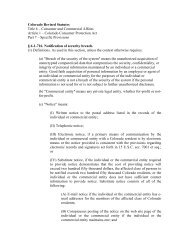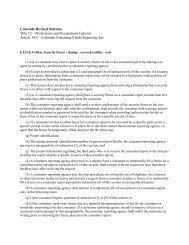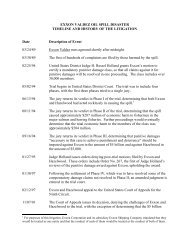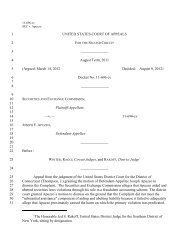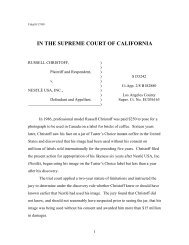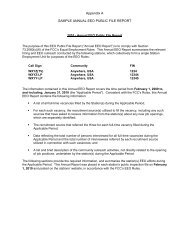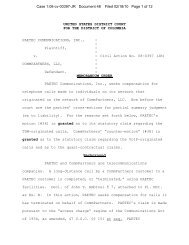QUANTA SERVICES INC, QUANTA SERVICES MANAGEMENT ...
QUANTA SERVICES INC, QUANTA SERVICES MANAGEMENT ...
QUANTA SERVICES INC, QUANTA SERVICES MANAGEMENT ...
Create successful ePaper yourself
Turn your PDF publications into a flip-book with our unique Google optimized e-Paper software.
Opportunities within the government arena could subject us to increased governmental regulation and costs.<br />
Most government contracts are awarded through a regulated competitive bidding process. As we pursue<br />
increased opportunities in the government arena, management’s focus associated with the start-up and bidding<br />
process may be diverted away from other opportunities. Involvement with government contracts could require a<br />
significant amount of costs to be incurred before any revenues are realized from these contracts. In addition, as a<br />
government contractor, we are subject to a number of procurement rules and other public sector regulations, any<br />
deemed violation of which could lead to fines or penalties or a loss of business. Government agencies routinely<br />
audit and investigate government contractors. Government agencies may review a contractor’s performance under<br />
its contracts, cost structure and compliance with applicable laws, regulations and standards. If government agencies<br />
determine through these audits or reviews that costs were improperly allocated to specific contracts, they will not<br />
reimburse the contractor for those costs or may require the contractor to refund previously reimbursed costs. If<br />
government agencies determine that we engaged in improper activity, we may be subject to civil and criminal<br />
penalties. In addition, if a government agency were to even allege improper activity, we also could experience<br />
serious harm to our reputation. Many government contracts must be appropriated each year. If appropriations are<br />
not made in subsequent years, we would not realize all of the potential revenues from any awarded contracts.<br />
We may not be successful in continuing to meet the requirements of the Sarbanes-Oxley Act of 2002.<br />
The Sarbanes-Oxley Act of 2002 has many requirements applicable to us regarding corporate governance<br />
and financial reporting, including the requirements for management to report on our internal controls over<br />
financial reporting and for our independent registered public accounting firm to express an opinion over the<br />
operating effectiveness of our internal control over financial reporting. During 2011, we continued actions to<br />
ensure our ability to comply with these requirements. As of December 31, 2011, our internal control over<br />
financial reporting was effective; however, there can be no assurance that our internal control over financial<br />
reporting will be effective in future years. Failure to maintain effective internal controls or the identification of<br />
significant internal control deficiencies in acquisitions already made or made in the future could result in a<br />
decrease in the market value of our common stock and our other publicly traded securities, the reduced ability to<br />
obtain financing, the loss of customers, penalties and additional expenditures to meet the requirements.<br />
If we are unable to enforce our intellectual property rights or if our intellectual property rights become<br />
obsolete, our competitive position could be adversely impacted.<br />
We utilize a variety of intellectual property rights in our services. We view our portfolio of proprietary<br />
energized services tools and techniques as well as our other process and design technologies as one of our<br />
competitive strengths, which we believe differentiates our service offerings. We may not be able to successfully<br />
preserve these intellectual property rights in the future and these rights could be invalidated, circumvented or<br />
challenged. In addition, the laws of some foreign countries in which our services may be sold do not protect<br />
intellectual property rights to the same extent as the laws of the United States. We also license certain<br />
technologies from third parties, and there is a risk that our relationships with licensors may terminate or expire or<br />
may be interrupted or harmed. If we are unable to protect and maintain our intellectual property rights, or if there<br />
are any successful intellectual property challenges or infringement proceedings against us, our ability to<br />
differentiate our service offerings could be reduced. In addition, if our intellectual property rights or work<br />
processes become obsolete, we may not be able to differentiate our service offerings, and some of our<br />
competitors may be able to offer more attractive services to our customers. As a result, our business and revenue<br />
could be materially and adversely affected.<br />
We may incur additional healthcare costs arising from federal healthcare reform legislation.<br />
In March 2010, the Patient Protection and Affordable Care Act and the Health Care and Education<br />
Reconciliation Act of 2010 were signed into law in the U.S. This legislation expands health care coverage to<br />
many uninsured individuals and expands coverage to those already insured. The changes required by this<br />
legislation could cause us to incur additional healthcare and other costs, although we do not expect any material<br />
short-term impact on our financial results as a result of the legislation. We are currently assessing the extent of<br />
any long-term impact from the legislation, including any potential changes to this legislation.<br />
29






